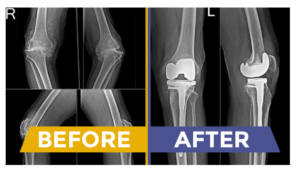Understanding Full Knee Replacement Surgery
Full knee replacement surgery, also known as total knee arthroplasty, is a medical procedure designed to replace damaged knee joints with artificial implants. This surgery is primarily performed to relieve severe knee pain and restore mobility in patients suffering from arthritis, injuries, or other degenerative joint conditions.
Why Full Knee Replacement Surgery is Necessary
- Severe Joint Pain: When pain persists despite medication and therapy.
- Limited Mobility: Difficulty in performing everyday activities like walking or climbing stairs.
- Chronic Knee Stiffness: The knee remains stiff, making movement difficult.
- Severe Osteoarthritis: When the knee joint is extensively damaged due to cartilage wear and tear.
- Failed Previous Treatments: When physical therapy, medication, and minor surgeries fail to provide relief.
Preparing for Full Knee Replacement Surgery
A successful surgery begins with thorough preparation. Here’s what patients need to know before undergoing full knee replacement surgery.
Pre-Surgery Consultation
- Medical Evaluation: Doctors assess overall health and determine the need for surgery.
- X-Rays and MRI Scans: Imaging tests help evaluate the extent of joint damage.
- Pre-Surgical Tests: Blood tests, ECG, and other screenings ensure the patient is fit for surgery.
- Lifestyle Adjustments: Patients may need to modify diet and exercise habits to improve post-surgery recovery.
- Medication Review: Certain medications may need to be stopped before surgery.

CONSULT DR VIDYASAGAR HOSPITAL TODAY FOR FULL REPLACEMENT SURGERY
Step-by-Step Procedure of Full Knee Replacement Surgery
Full knee replacement surgery follows a structured approach to ensure the best results.
Step 1: Administering Anesthesia
- General or Spinal Anesthesia: Patients either receive full-body anesthesia or a spinal block.
- Numbing the Area: Ensures the procedure is pain-free for the patient.
- Monitoring Vital Signs: Heart rate, blood pressure, and oxygen levels are tracked throughout the procedure.
Step 2: Incision and Exposure of the Knee Joint
- Surgical Incision: A cut of about 6-10 inches is made over the knee.
- Accessing the Joint: The surgeon carefully moves soft tissues aside to expose the knee joint.
- Assessing Joint Damage: The damaged bone and cartilage are examined before proceeding.
Step 3: Removing Damaged Cartilage and Bone
- Resection of the Bone: The surgeon removes damaged cartilage and worn-out bone from the femur (thigh bone) and tibia (shin bone).
- Shaping the Bone: The bone ends are shaped to fit the prosthetic components precisely.
- Cleaning the Area: The joint area is cleaned to ensure a proper fit for the implant.
Step 4: Implanting the Prosthetic Knee Joint
- Fitting the Metal Components: The artificial joint, made of metal and plastic, is attached to the prepared bone surfaces.
- Securing the Implant: The implant is fixed in place using cement or a press-fit technique.
- Placing the Plastic Spacer: A plastic insert is placed between the metal components to allow smooth movement.
Step 5: Closing the Incision
- Repositioning Soft Tissues: The surgeon ensures muscles and ligaments are placed correctly.
- Stitching the Incision: The wound is closed using sutures or staples.
- Bandaging the Knee: A sterile dressing is applied to prevent infection.
Recovery Process After Full Knee Replacement Surgery
Recovering from full knee replacement surgery requires commitment and proper care.
Immediate Post-Surgery Care
- Pain Management: Painkillers and anti-inflammatory medications are administered.
- Physical Therapy Begins: Gentle movements help prevent stiffness and blood clots.
- Hospital Stay: Most patients stay in the hospital for 2-4 days for monitoring.
First Few Weeks of Recovery
- Using Assistive Devices: Walkers or crutches may be necessary.
- Physical Therapy Sessions: Patients gradually regain mobility and strength.
- Home Preparation: Adjustments like installing handrails and removing obstacles help prevent falls.
- Regular Checkups: Doctors monitor healing progress and adjust treatment if necessary.
Long-Term Rehabilitation
- Strengthening Exercises: Leg strengthening helps restore full knee function.
- Gradual Return to Activities: Walking, light exercises, and daily activities can be resumed slowly.
- Avoiding High-Impact Activities: Running or jumping should be avoided to prolong implant life.
- Monitoring for Complications: Swelling, infection, or unusual pain should be reported to a doctor immediately.
Potential Risks and Complications
While full knee replacement surgery is generally safe, it carries some risks.
Common Risks
- Infection: Can occur at the incision site or deep within the joint.
- Blood Clots: Can form in the legs and require medication to prevent.
- Nerve or Blood Vessel Damage: Rare but may affect sensation or movement.
- Implant Loosening: Over time, the artificial joint may become loose and require revision surgery.
- Stiffness and Limited Mobility: Some patients experience persistent stiffness despite rehabilitation.
How to Ensure a Smooth Recovery
Following best practices ensures optimal recovery after full knee replacement surgery.
Tips for a Successful Recovery
- Follow the Doctor’s Instructions: Adhering to prescribed medications and guidelines is crucial.
- Attend All Physical Therapy Sessions: Helps restore knee function and prevent stiffness.
- Maintain a Healthy Diet: Eating nutritious foods aids healing.
- Practice Proper Posture: Avoiding strain on the knee joint reduces complications.
- Be Patient: Recovery takes time, so consistent efforts are necessary.
Why Choose Vidyasagar Hospital for Full Knee Replacement Surgery
Vidyasagar Hospital in Kadapa is a leading medical facility specializing in full knee replacement surgery. Patients receive world-class treatment and personalized care for optimal recovery.
Why Vidyasagar Hospital Stands Out
- Experienced Orthopedic Surgeons: Skilled doctors ensure precision and safety.
- Advanced Technology: The latest surgical techniques for better outcomes.
- Comprehensive Post-Operative Care: Dedicated rehabilitation programs for a smooth recovery.
- Affordable and Transparent Pricing: Quality treatment at reasonable costs.
- High Patient Satisfaction: Numerous successful knee replacement surgeries performed.
Conclusion
Full knee replacement surgery is a life-changing procedure for individuals suffering from chronic knee pain and limited mobility. By understanding the step-by-step process, recovery expectations, and potential risks, patients can prepare themselves for a successful surgery.
For those seeking the best care in Kadapa, Vidyasagar Hospital provides top-tier full knee replacement surgery with advanced medical technology and expert surgeons. If you or your loved one needs knee replacement surgery, consult Vidyasagar Hospital today for the best treatment and rehabilitation support.
For more details, visit: Vidyasagar Hospital



Recent Comments